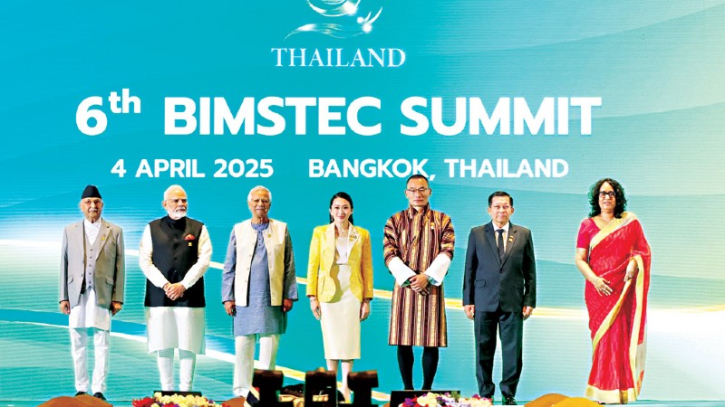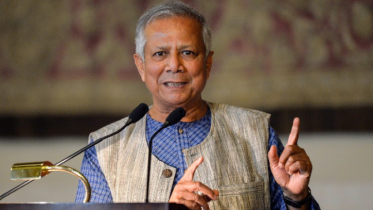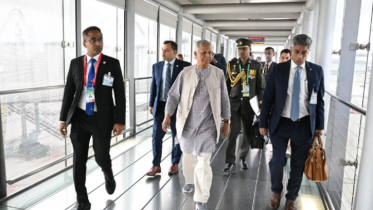
Work together for shared benefit: Yunus
Bangladesh interim government’s chief adviser Professor Muhammad Yunus on Friday urged the Bay of Bengal Initiative for Multi-Sectoral Technical and Economic Cooperation to work together for mutuality of interests and shared benefits as he addressed the 6th BIMSTEC Summit in Bangkok of Thailand, reports the Bangladesh Sangbad Sangstha.
‘Bangladesh has long nurtured the vision of open regionalism. We envision a region where all the countries and communities can engage based on equity, mutual respect, mutuality of interests and shared benefits,’ he said.
The chief adviser said that the BIMSTEC region hosts one-fifth of the global population while challenges abound, converting those challenges into opportunities holding considerable prospect for all.
‘Many label our demography as a “challenge”. Yet, there are enough instances to illustrate the untapped “promises” of our population,’ he said.
Bangladesh on Friday received the BIMSTEC chairmanship for the next two years from Thailand.
Thailand prime minister Paetongtarn Shinawatra handed over the BIMSTEC chairmanship to Yunus at the end of the BIMSTEC Summit in Bangkok.
In hosting the BIMSTEC Secretariat, Yunus said that Bangladesh stands ready to unlock the vast potential of an organisation in a meaningful way.
About the potential of BIMSTEC, he said that energy security was fundamental to the sustainable development and economic resilience of the BIMSTEC region.
‘We must work together to harness our collective potential in renewable energy, cross-border electricity trade, and energy efficiency to ensure a secure and sustainable future for our people,’ he said.
The chief adviser, who went to Bangkok on Thursday to join the 6th BIMSTEC Summit, returned home Friday evening.
Yunus said that he was confident that the BIMSTEC Agreement on Grid Interconnection signed in 2018 could act as a launching pad for cooperation in the field of energy.
‘As per our BIMSTEC commitment we are committed to enhancing connectivity, improving mutual trade and economic collaboration among all member countries,’ he said.
He also said that promoting trade and investment, facilitating movements of people particularly of the young boys and girls within BIMSTEC was key to enhancing wellbeing of their people.
‘Currently, intra-regional trade stands at just 5.9 per cent. As the lead country in trade, investment and development sector, Bangladesh would urge all to materialise implementation of the BIMSTEC Framework Agreement on FTA that we signed way back in 2004, that will ultimately contribute towards better connectivity,’ he said.
The BIMSTEC Master Plan on Transport Connectivity was adopted at the fifth BIMSTEC Summit, the chief adviser said, adding that its timely implementation was crucial for the countries.
He said, ‘Some of the countries have accomplished much bilaterally. In order to reap the benefits of effective regional economic integration and development, the regional measures need to be materialised.’
Bangladesh stands ready to extend all possible support for the implementation of the master plan, he added.
Yunus said that the BIMSTEC Agreement on Maritime Transport Cooperation was signed on April 3, which would certainly contribute towards enhanced connectivity within BIMSTEC region particularly with the landlocked member states and seven sisters of India.
Noting that the BIMSTEC has been in existence for 28 long years, he said to be candid, its impacts were not still felt across the member states and beyond.
He said that signing and ratification of the Charter and formulation of the relevant Rules of Procedure had accorded the BIMSTEC processes and institutions considerable strength.
‘Our civil society and private sector particularly stress BIMSTEC to take up tangible and result-oriented initiatives, and projects amongst our countries,’ the chief adviser said.
As Bangladesh assumes the BIMSTEC chairmanship, he called upon all member states to extend their valued support in redeeming their collective commitments to revitalise the organisation.
‘We need a genuinely shared sense of mutual confidence and mutuality of interests, rising above our differences and divergences. Whatever we undertake or do collectively, we need to be driven by impact and results,’ he said.
The chief adviser stressed rediscovering the modalities and institutions of regional and sub-regional collaboration under BIMSTEC.
Addressing inequality of income and choices, balancing economy and ecology need to be overriding objectives in pursuing their sectoral cooperation, he said.
‘While each of our countries pursue our national interests, we also need to appreciate the same of “others” in the table in shaping and moving our wider cooperative agenda,’ Yunus said.
In a fast-moving world, comparing the developments of the past decade seems a bit distant past, he said, adding many of long-held norms, regulations were giving in.
‘I find institutions often struggling to meet people’s aspirations. In making our institutions fit-for-purpose, I have been advocating for an overhaul of the financial system as also launch innovative social businesses that would uphold dignity and ensure an individual’s security, not just augment wealth,’ he said.
‘Within and beyond the region, resources, capacities and solutions abound to address many of our endemic challenges, like climate change,’ the chief adviser said.
‘As much as we facilitate knowledge and technology amongst our seven countries, let us also open up to the world – the governments, the knowledge institutions, foundations, private sector – who would share our values and appreciate our needs,’ he added.
Thai prime minister and chairperson of the Summit Paetongtarn Shinawatra, BIMSTEC secretary general ambassador Indra Mani Pandey and distinguished heads of delegations from the BIMSTEC member states were present on the occasion.
Upon receiving the chairmanship from the Thailand premier, the Bangladesh chief adviser made a statement of acceptance, focusing on an inclusive and action-oriented BIMSTEC and outlining Bangladesh’s vision and priorities for the regional group.
He reaffirmed Bangladesh’s commitment to advancing regional cooperation and development.
Leaders of BIMSTEC member states unanimously adopted the Bangkok Declaration and the BIMSTEC Bangkok Vision, a strategic roadmap aimed at guiding the organisation toward sustainable development and deeper economic integration.
The BIMSTEC comprises seven countries of the Bay of Bengal region — Bangladesh, Bhutan, India, Myanmar, Nepal, Sri Lanka and Thailand.
The changeover of chairmanship takes place during the Summit whereby the member state chairing BIMSTEC hosts the Summit and hands over the chairmanship to the member state next in alphabetical order.
The United News of Bangladesh reports: Yunus on Friday said that holding the national election in a participatory manner at the earliest possible time was on top of their agenda.
‘I have assured our people that, once our mandate is fulfilled in the conduct of elections as well as the required reform is done, we shall hold a free, fair and participatory election,’ he said while delivering his speech at the BIMSTEC Summit.
Yunus said that they would continue to work steadfastly to ensure the constitutional rights of every citizen of the country whether they are women or the members of ethnic and religious minorities as they rebuild Bangladesh.
He said that the interim government in Bangladesh was pledge-bound to undertake robust and far-reaching reforms to restore economic stability and sustained growth.
‘We are committed to good governance, combating corruption and bringing order to every sphere of economy,’ he said, adding that these were at the core of the reforms they had planned.
In 1971, hundreds of thousands of ordinary women and men, children and youths made supreme sacrifice in a nine-month long genocide, fighting against a brutal military, said the chief adviser.
He said that people aspired for an inclusive, just and free society where every ordinary person could materialise his or her dreams.
Sadly, Yunus said, in the course of past fifteen years, people, especially the youth, progressively saw their spaces and rights curtailed. ‘They witnessed the deep erosion of almost every state institution and civic rights trampled.’
The chief adviser said the common mass brought an end to the ‘brutal authoritarian’ regime, at the expense of lives of close to 2,000 innocent people, mostly youths, including 118 children. ‘The people of Bangladesh witnessed a re-birth in her history.’
‘The student leaders, who led the uprising and freed the country from the corrupt and autocratic regime of Sheikh Hasina, appealed to me to lead the country during this crucial juncture of our history,’ Yunus said. ‘I agreed to take the responsibility, for the sake of our people.’
Yunus took a moment to express his heartfelt condolences and deepest sympathies to the governments and the people of Thailand and Myanmar in the aftermath of the recent devastating earthquake that has caused a huge loss of life and property in Myanmar and Thailand.
‘Bangladesh stands in solidarity with our brothers and sisters from Thailand and Myanmar during this difficult time,’ Yunus said.
‘We also extend our heartfelt condolences to the families who have lost their loved ones and pray for the quick recovery of the injured,’ he said, adding that he was confident that given the strong leadership and the government’s efforts, they would be able to overcome the challenges and restore normalcy in the affected areas.
Yunus conveyed his sincere appreciation to the government of Thailand for carrying forward the BIMSTEC process since it took off in 1997 in Thailand.
‘I would also like to convey our deep appreciation to you for the warm reception and hospitality extended to me and my delegation since our arrival,’ he said.
Yunus appreciated BIMSTEC secretary general Indra Mani Pandey for his leadership to the BIMSTEC Secretariat.


























